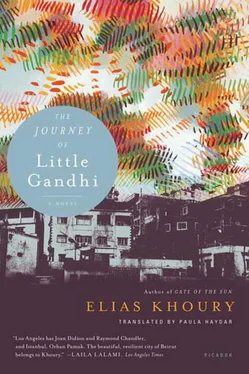“I’m like a fisherman,” he’d say to his wife. “I’m the fisher of souls. I go to locked-up churches and open them. I heal the sick, make the lame walk, and preach.”
He’d take a bath and sit down with a bottle of whiskey, and he wouldn’t get up until it was empty. His wife couldn’t understand how a preacher could get drunk, for she was the daughter of a preacher and grew up inside the church. She never witnessed such drunkenness except in that house. But she didn’t say anything. She saw in her husband the ghost of his father. She’d visited him once at their house in Ashrafiyyeh, before he died. She understood they belonged to a different milieu and a different world. Amin’s father, Tannous al-Aramouni, was a tall man who limped and was cross-eyed. He lived in a country home in Ashrafiyyeh. surrounded by China trees and a garden filled with loquat and almond trees, and one lone lemon tree and a tall palm tree. He was the only middle-aged man with no relatives, because his cousins, who lived in the village of Aramoun in the Aley area near Beirut, decided to cut off ties with him when he became a Protestant. But he had been forced into it. He told his wife if he hadn’t become a Protestant he’d have died of starvation during World War I. But his wife went along with everything and went to that church that looked nothing like the churches she was accustomed to — there was not a single icon. She’d shut her eyes from that picture that made her want to laugh, and she’d pray like the others. At home, in a corner of her room, she kept a box of Byzantine icons. In front of the icons was an oil lamp whose wick burned night and day. She insisted on christening her children in the baptismal font at the monastery of Saint Elias Btina in Beirut. She brought the children one by one, all the way from Sidon to Beirut and immersed them in the font. She believed it would cure all illness and cleanse body and soul. Amin’s mother hated Sidon and she couldn’t understand how they got to be like that, but she was obedient to her husband. When he told her he’d changed his religion, she went along with it. He said she had to learn the new religion. She said she didn’t have to, because all religions were the same to her. Whatever you want, she told her husband, is fine with me.
Her husband changed. Actually, nothing changed in him except the way he talked. Um Amin said to her halfsenile mother-in-law that he’d started speaking Arabic with a quasi-classical manner, like the Palestinian Protestant pastor of the church in Sidon.
“If it hadn’t been for my job at the American School I’d never have been able to send my kids to school. And if it hadn’t been for this new Christian denomination, we’d have died of hunger, like dogs.” Um Amin believed that all religions were similar, and she got used to the new one, but she never gave up making the sign of the cross like an Orthodox.
During her husband’s last days, when Amin went to the American University to study theology and her second son, Nicholas, got a job in one of the hotels on Lake Tiberias, Um Amin went back to Beirut, leaving the rest of the family in Sidon. In Ashrafiyyeh, in the house she inherited from her father, Um Amin resumed her old relationships with family and neighbors. Abu Amin Aramouni’s health deteriorated quickly and he became senile. He used to get lost in the streets of Ashrafiyyeh, thinking it was Sidon. He’d go to the coastal town of Dowra and sit for a long time thinking he was sitting at the port of Sidon. The woman was afraid her husband would get lost in the streets of Beirut, and Amin couldn’t care less.
When Amin became a pastor, his mother’s eyes were filled with tears, but his father, on the other hand, who’d been dressed up with a tie and all and was told to remove his fez in the church, was totally lost. Amin became a pastor and got married the same day. Um Amin gave her blessing.
“She’s a nice girl. I wish you the best, my son. But tell her to speak to us in Arabic.”
Eugenie, the Reverend Nabil Khoury’s daughter, refused to visit the family in Ashrafiyyeh.
“Your mother talks too much,” she said to him once.
Um Amin was the one who told Eugenie about his grandmother Um Tanios.
“Why did you tell her, Mom?”
“I wanted to entertain her, and she should know something about us,” she said.
“She knows, but it was really unnecessary.”
Um Amin told Eugenie the story of Um Tanios and how she became a Muslim saint.
She told her how Abu Amin tried to shut his mother up. Abu Hasan al-Hawwari came and kneeled at her feet and began kissing her. The delegations never stopped coming, and the cobbler didn’t know what to do. When the woman died, al-Hawwari insisted on burying her in a Muslim cemetery. After long discussions and a lot of shouting, the two men came to an agreement. They performed the cleansing and shrouding for burial and then she was taken to Beirut, where she was buried in the family cemetery at Saint Mitr Church.
Um Tanios was eighty years old, living with her son and his family in their new house in Sidon. It was a one-story house with four rooms and a courtyard. The old woman lived in a room overlooking the courtyard. She was completely independent; she ate nothing but bread and water and never slept. She’d go often to the bathroom located on the edge of the courtyard. Night was a rhythm of footsteps pitter-pattering on the tiles of the courtyard. It was as if she never slept a wink.
Um Tanios didn’t like Sidon and wanted to go back to Beirut, She’d laugh at her son when he told his small children to shut their eyes and pray before eating their meals. She’d sit all alone in front of the door to her room, even in the dead of winter, moving her lower jaw incessantly. After the First World War, she fell and broke her leg. After that she was unable to get out of bed, and she started forgetting things.
“It’s senility,” the doctor told her son.
“Impossible,” Abu Amin said. “There is no history of senility in our family.”
“She’s got hardening of the arteries. There’s nothing we can do.”
She stayed in her bed for years. Um Amin took care of her while the old woman swore and moaned and went in and out of consciousness.
Then that strange thing happened.
It was about ten o’clock in the morning when this semiparalyzed woman began to shout in a loud voice, “O Muhammad, my Beloved.”
Um Amin ran to her and found her sitting up in bed talking.
“A tall, dark young man, O Muhammad, my Beloved, let go of me, I want to get up. A young man, his mustache twirled upward, carrying a staff in his hand, stood beside me and poked me. He said to me, Um Tanios, stand up and walk. The end to your sorrow has come, my dear, you will get up. He poked me on the forehead with his staff, then on my stomach. He put the staff down and told me to get up. A young man, dark, tall, O Muhammad, my Beloved, let go of me, I want to get up, let go of me. Why have you tied me to the bed, he said to me, O my Beloved.”
Um Amin screamed at her to shut up. But she went on, and her voice began to fade. She was covered with her own excrement as she tried to get up. She calmed her down, wiped her face with a wet cloth, and began washing her. The old woman wouldn’t settle down. She’d push and shout, “My Beloved, dark and tall, you will get up, let go of me, I want to get up, O my Beloved, O Muhammad.”
Um Amin heard footsteps out in the courtyard. She left the room and locked the door behind her only to find Abu Hasan al-Hawwari with a group of men standing in the middle of the courtyard.
“What’s going on, neighbor?” al-Hawwari asked.
“Nothing. The woman is senile and she’s screaming,” said Um Amin.
“Have shame, woman of God. Cover your head and let us go see Mother.”
Читать дальше












